最新定语从句讲解与练习
- 格式:ppt
- 大小:531.00 KB
- 文档页数:30
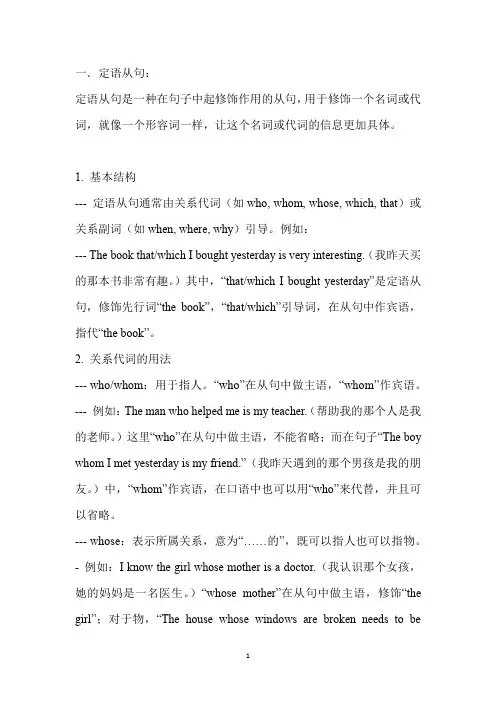
一.定语从句:定语从句是一种在句子中起修饰作用的从句,用于修饰一个名词或代词,就像一个形容词一样,让这个名词或代词的信息更加具体。
1. 基本结构---定语从句通常由关系代词(如who, whom, whose, which, that)或关系副词(如when, where, why)引导。
例如:--- The book that/which I bought yesterday is very interesting.(我昨天买的那本书非常有趣。
)其中,“that/which I bought yesterday”是定语从句,修饰先行词“the book”,“that/which”引导词,在从句中作宾语,指代“the book”。
2. 关系代词的用法--- who/whom:用于指人。
“who”在从句中做主语,“whom”作宾语。
---例如:The man who helped me is my teacher.(帮助我的那个人是我的老师。
)这里“who”在从句中做主语,不能省略;而在句子“The boy whom I met yesterday is my friend.”(我昨天遇到的那个男孩是我的朋友。
)中,“whom”作宾语,在口语中也可以用“who”来代替,并且可以省略。
--- whose:表示所属关系,意为“……的”,既可以指人也可以指物。
-例如:I know the girl whose mother is a doctor.(我认识那个女孩,她的妈妈是一名医生。
)“whose mother”在从句中做主语,修饰“the girl”;对于物,“The house whose windows are broken needs to berepaired.”(窗户破了的那所房子需要修理。
)--- which:用于指物,在从句中可以作主语或宾语。
---例如:The movie which we watched last night was really exciting.(我们昨晚看的电影真的很刺激。
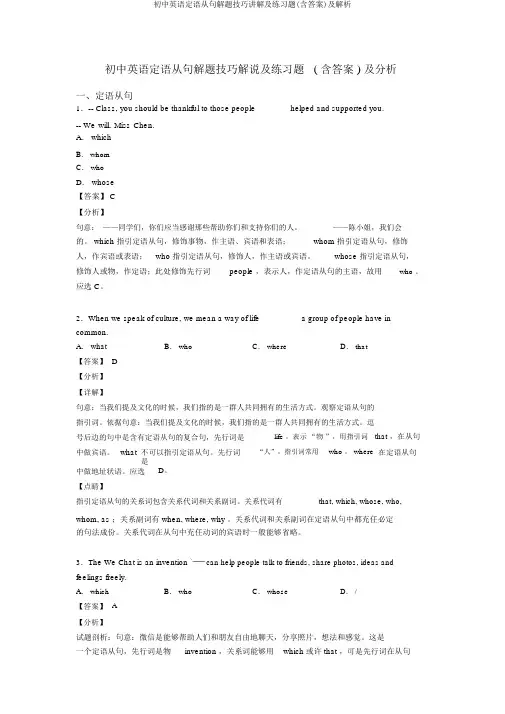
初中英语定语从句解题技巧解说及练习题( 含答案 ) 及分析一、定语从句1.-- Class, you should be thankful to those people _______ helped and supported you.--We will. Miss Chen.A. whichB. whomC. whoD. whose【答案】 C【分析】句意:——同学们,你们应当感谢那些帮助你们和支持你们的人。
——陈小姐,我们会的。
which 指引定语从句,修饰事物,作主语、宾语和表语;whom 指引定语从句,修饰人,作宾语或表语;who 指引定语从句,修饰人,作主语或宾语。
whose 指引定语从句,修饰人或物,作定语;此处修饰先行词people ,表示人,作定语从句的主语,故用who 。
应选 C。
2.When we speak of culture, we mean a way of life_________ a group of people have in common.A. what B. who C. where D. that【答案】D【分析】【详解】句意:当我们提及文化的时候,我们指的是一群人共同拥有的生活方式。
观察定语从句的指引词。
依据句意:当我们提及文化的时候,我们指的是一群人共同拥有的生活方式。
逗号后边的句中是含有定语从句的复合句,先行词是life ,表示“物”,用指引词that ,在从句中做宾语。
what不可以指引定语从句。
先行词“人”,指引词常用who 。
where在定语从句是中做地址状语。
应选D。
【点睛】指引定语从句的关系词包含关系代词和关系副词。
关系代词有that, which, whose, who, whom, as ;关系副词有 when, where, why 。
关系代词和关系副词在定语从句中都充任必定的句法成份。
关系代词在从句中充任动词的宾语时一般能够省略。
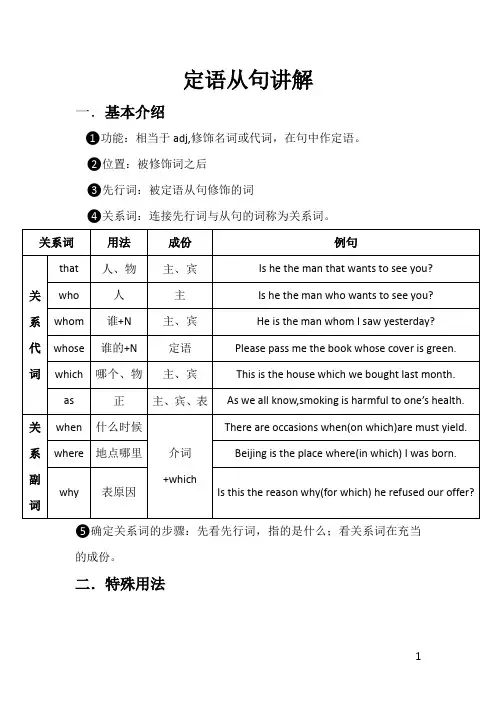
定语从句讲解一.基本介绍❶功能:相当于adj,修饰名词或代词,在句中作定语。
❷位置:被修饰词之后❸先行词:被定语从句修饰的词❹关系词:连接先行词与从句的词称为关系词。
❺确定关系词的步骤:先看先行词,指的是什么;看关系词在充当的成份。
二.特殊用法1.He was looking pleasantly at the children and parcels______filled his bus.2.The village is no longer the one ___it was five years ago. 5.Such books____you bought are useful.23.Which are the books____you bought for me? 6.____ is known,the earth is round.4.There is a room,_____window faces the river. 7.There is lots of air in loose snow,_____can keep the cold out.3高中定语从句练习(整理)1. They talked for about an hour of things and persons _____ they remembered in the factory.A. whichB. thatC. whoD. whom2. We are going to spend this Spring Festival in Beijing, _____ live our grandparents and some relatives.A. whichB. thatC. whoD. where3. There are many areas in the world _____ lack experienced doctors.A. whereB. in whichC. whichD. what4. The years and months _____ we spent together are really wonderful to us all.A. whenB. on whichC. in whichD. that5. _____ has been described above, it is a general rule that solids expand as the temperature increases and contract when they are cooled.A. ItB. AsC. ThatD. Which6. A. who’s B. which C. whose7. Susan is not the brilliant writer _____ she used to be. D. thisA. whichB. thatC. whoD. whom8. I, who _____ your friend, will try my best to help you.A. beB. amC. areD. is9. The size of the audience, _____ we had expected, was well over 1600.A. asB. thatC. whichD. who10. They have started an investigation, _____ are being kept secret.A. whose detailB. whose the detailsC. the details of whichD. the detail of it11. Have you ever asked him the reason _____ may explain his absence?A. whyB. for whichC. whichD. what12. There were two rooms in the beach house, _____ served as a kitchen.A. the smaller of themB. the smallest of whichC. the smaller of whichD. smallest of which13. He imagined various ways _____ he could teach her how to learn English well.A. /B. thatC. in whichD. A , B & C14. The speed _____ light travels is said to be the maximum in the universe.A. in whichB. by whichC. at whichD. from which15. Can you think out a situation _____ this idiom can be used?A. in whichB. thatC. whereD. A & C16. China has hundreds of islands, _____ is Taiwan.A. in which the largestB. its largest of whichC. of which the largestD. which the largest17. We ate in a luxurious restaurant but it wasn’t such a good dinner _____ she had promised us.A. thatB. whichC. asD. what18. They stayed with me for three weeks, _____ they drank all the wine I had.A. whichB. which timeC. during whichD. during which time19. She was dressed in the same way _____ she was when I saw her last time.A. thatB. asC. onceD. in which20. The fire started on the first floor of the hospital, _____ patients are mostly elderly people.A. itsB. whichC. whoseD. their21. The company official _____ I thought would be fired received a raise.A. whomB. whoeverC. whoD. of whom22. Alec asked the policeman _____ he worked to contact him whenever there was an accident.A. with himB. whoC. whomD. with whom23. We are living in an age _____ many things are done on computer.A. at whichB. thatC. whenD. which24. The factory produces half a million pairs of shoes every year, 80% _____ are sold abroad.A. whichB. which ofC. of whichD. of that25. The road conditions there turned out to be very good, _____ was more than we could expect.A. itB. whichC. whatD. that26. He’s such a good teacher _____ we all love and respect.A. thatB. as C who D. whom27. Today, more and more people are concerned about the way _____ the environment is being destroyed.A. whichB. in thatC. in whichD. how28. The old man finally got a chance to visit the school, _____ he used to study, _____ he had beendreaming of for years.A. that…whichB. where…thatC. in which…whatD. where…which29. This is the least interesting book _____ during my holidays.A. that I have ever read itB. what I have ever readC. I have ever readD. which I have ever read30. The result is not the same _____ they had expected, _____ was rather disappointing.A. which…asB. as... thatC. that…whichD. as…which31. We interviewed the old lady, _____ had been killed in the air crash last week.A. whose all childrenB. all her childrenC. all of her childrenD. all of whose children32. There are altogether eleven books on the shelf, _____ are mine.A. of which fiveB. in which fiveC. five of whichD. A & C33. ---Is this dictionary _____ you want to buy?---Yes, this is the very dictionary _____ I need.A. which…thatB. the one…whichC. the one…/D. the one that…which34. I’ll give you my friend’s home address, _______ I can be reached most evenings.A. whichB. whenC. whomD. where35. The friendship is like health, _____ is seldom known until it is lost.A. its valueB. the value of itC. the value of whichD. whose the value36. I can think of many cases _____ students obviously knew a lot of English words and expressions butcouldn’t write a good essay.A. whichB. in whichC. whereD. B & C37. The artist _____ the judge gave a prize is the teacher _____ I have been taught painting for two years.A. from whom…by whomB. to whom…whoC. to whom…by whomD. from whom…who38. American women usually identify their best friend as someone _____ they can talk frequently.A. whoB. asC. about whichD. with whom39. Last night I took a taxi, _____ took me straight home.A. and itB. itC. whichD. A & C40. I shall never forget the days _____ I lived in the countryside with the farmers, _____ has a great effecton my life.A. when…thatB. when…whenC. when…whichD. which…which41. The town _____ you visited last month is the one _____ Einstein was born.A. where…whereB. which…whichC. that…whereD. that...which42. He’s got himself into a dangerous situation _____ he is likely to lose control over the plane.A. whereB. whichC. at whichD. in that43. Tom’s mother kept telling that he should work harder, _____ didn’t help.A. but itB. asC. whichD. A & C44. I’m looking for a present for my mother’s birthday, _____ she can use and at a reasonable price.A. thatB. oneC. whatD. which45. There isn’t much _____ I can do, _____ makes me disappointed.A. that…whichB. which…thatC. that…thatD. which…which46. That e-book is no larger than an ordinary book with a screen _____ you can read novels.A. in whichB. thatC. whereD. of which47. "Who moved my cheese?”, _____ is a best-selling book, is written by Spencer Johnson.A. whichB. thatC. itD. whose48. Shirley said that she would have a two-week holiday in July, _____ I think, is impossible.A. itB. thatC. whenD. which49. It was an exciting moment for these football fans this year, _____ for the first time in years their teamwon the World Cup.A. thatB. whichC. whenD. while50. I was so angry at all _____ he was doing _____ I walked out.A. that…thatB. which…thatC. which…whichD. /…which51. The moment he set his foot in the new country, to his great surprise, he was surrounded by friendlypeople_____ he could turn for help.A. from whomB. to whomC. on whomD. by whom52. It was not until Mum agreed to take her to KFC, _____ was her favorite, _____ the spoilt girl stoppedcrying.A. that…thatB. that…whichC. which…thatD. which…which53. You can use a large plastic bottle, _____ cut off, as a pot to grow flowers in. Which is wrong?A. the top of which isB. whose top isC. its top isD. with its to54. The British are not so familiar with different cultures and ways of doing things, ______is often thecase in other countries.A. thatB. soC. whatD. as55. Keep the drug _____ is out of children reach.A. in a place whereB. whereC. in a place whichD. in which56. When we talk about the cities in United States, the first _____ comes into our mind is New York.A. oneB. cityC. thatD. which57. He arrived in Shanghai in 2003, _____, some time later, he became a teacher.A. whenB. whereC. thatD. which58. The challenge is to create a system, _____ the farmers can teach the world about plant medicine.A. whereB. whichC. whenD. for which59. Jogging on the road was one of the reasons _____ 21 people, including 20 students and 1 teacher, diedand another 16 were injured in the accident in Shanxi Province.A. becauseB. whichC. for whichD. how60. It was in the Beihai Park, _____ they made a date for the first time _____ the old couple told us their love story.A. where…thatB. that…whereC. that…thatD. where…when定语从句Key1. BDCDB 6. CBBAC 11. CCDCD 16. CCDBC 21. CDCCB 26. BCDCD 31. DDCDC 36. DCDDC 41. CADB A 46.CADC A 51.BCCDC 56. CBACA。

初中定语从句讲解及练习第一部分:基础知识(一).定语从句概述定语可以由形容词,代词,数词,名词,不定式,介词短语来充当。
如果是一个句子担任定语,那么这个句子就叫做定语从句,又可称为形容词性从句。
定语从句通常修饰某一名词或代词,被定语从句修饰的这一名词或代词叫先行词,它位于定语从句之前,定语从句在先行词后面,应尽量紧跟先行词。
定语从句的作用即在于对先行词进行限定说明或补充说明。
(二).定语从句的引导词。
定语从句的引导词分为两类,关系代词(that, which, who, whom, whose )和关系副词(when, where, why ),引导词在先行词和定语从句之间,既起连接作用,即连接先行词和定语从句,更重要的是,它又在定语从句中作一个成分。
(三).关系代词1. that 指人,物,在从句中作主语,宾语,表语。
This is the photo that I took in the country.He is the singer that I met yesterday.2. which 指物,在从句中作主语,宾语,在非限定定语从句中充当定语,或者代替前句The film which we saw last night was moving.3. who 指人,在从句中作主语,宾语。
The person who visited our classroom yesterday was our new headmaster.The man who you just talked to is Tom.4. whom 指人,在从句中作宾语。
That is the professor whom you want to know.5. whose 指人,物,在从句中作定语,相当于先行词+ ’s, 后接一名词。
I know the boy whose parents are dead.I don’t like those cities whose roads are dirty.注:关系代词在从句中作宾语时可以省略。
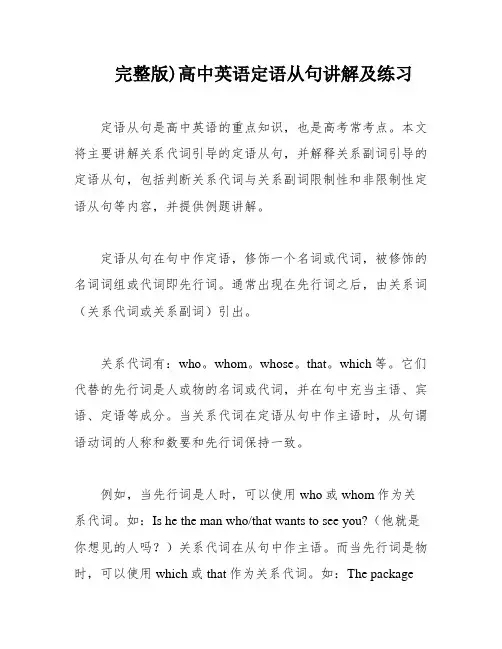
完整版)高中英语定语从句讲解及练习定语从句是高中英语的重点知识,也是高考常考点。
本文将主要讲解关系代词引导的定语从句,并解释关系副词引导的定语从句,包括判断关系代词与关系副词限制性和非限制性定语从句等内容,并提供例题讲解。
定语从句在句中作定语,修饰一个名词或代词,被修饰的名词词组或代词即先行词。
通常出现在先行词之后,由关系词(关系代词或关系副词)引出。
关系代词有:who。
whom。
whose。
that。
which等。
它们代替的先行词是人或物的名词或代词,并在句中充当主语、宾语、定语等成分。
当关系代词在定语从句中作主语时,从句谓语动词的人称和数要和先行词保持一致。
例如,当先行词是人时,可以使用who或whom作为关系代词。
如:Is he the man who/that wants to see you?(他就是你想见的人吗?)关系代词在从句中作主语。
而当先行词是物时,可以使用which或that作为关系代词。
如:The package(which / that)you are carrying is about to come unwrapped.(你拿的包快散了。
)关系代词在从句中作宾语。
除了who。
whom。
whose。
that。
which,还有关系副词when。
where。
why等。
关系副词引导的定语从句也可以修饰一个名词或代词。
例如:I still remember the day when we met.(我仍然记得我们相遇的那一天。
)关系副词when在从句中作时间状语,修饰先行词day。
总之,掌握定语从句的用法和关系词的选择是英语研究的重要内容。
通过不断的练和实践,相信大家可以掌握这一技能。
关系副词可以代替时间、地点或理由的名词,在从句中作状语。
例如,关系副词when。
where。
why的含义相当于“介词+ which”结构,因此常常和“介词+ which”结构交替使用。
比如,有时候我们必须屈服,这是任何人都会遇到的情况(There are ns when [on which] one must yield)。
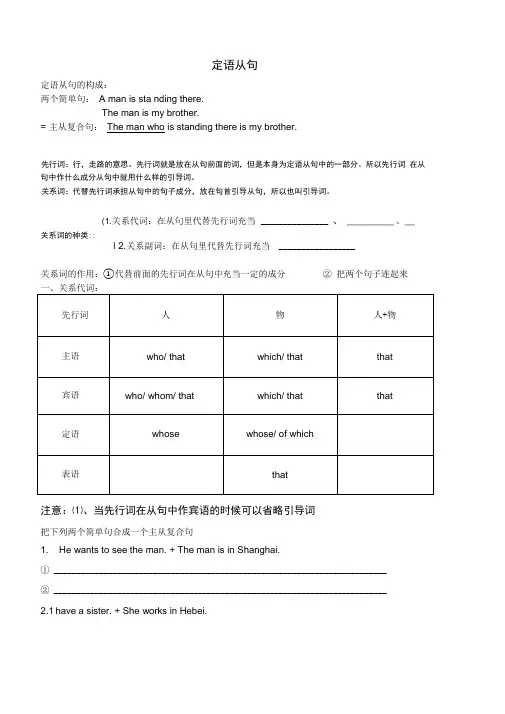
定语从句定语从句的构成:两个简单句:A man is sta nding there.The man is my brother.= 主从复合句:The man who is standing there is my brother.先行词:行,走路的意思。
先行词就是放在从句前面的词,但是本身为定语从句中的一部分。
所以先行词在从句中作什么成分从句中就用什么样的引导词。
关系词:代替先行词承担从句中的句子成分,放在句首引导从句,所以也叫引导词。
(1.关系代词:在从句里代替先行词充当_______________ 、_________ 、__关系词的种类::I 2.关系副词:在从句里代替先行词充当 _________________关系词的作用:①代替前面的先行词在从句中充当一定的成分② 把两个句子连起来一、关系代词:注意:⑴、当先行词在从句中作宾语的时候可以省略引导词把下列两个简单句合成一个主从复合句1. He wants to see the man. + The man is in Shanghai.① __________________________________________________________________________② __________________________________________________________________________2.1 have a sister. + She works in Hebei.① __________________________________________________________________________② __________________________________________________________________________4.Do you know the girl? + Her mother works here.① __________________________________________________________________________② __________________________________________________________________________5.1 live in a room. + Its door faces south.① __________________________________________________________________________② __________________________________________________________________________⑵先行词做宾语时who与whom的区别一般情况下不进行区分,除非是紧跟在介词之后1. This is the man. The police are looking for him.—This is the man who/whom/that ) the police are looking for.【who/whom/that 可以省略】其中介词for可以提前—This is the man for whom the police are looking.介词在引导词前面只能用whom,而且不能省略,因为介词之后只能接宾格注:that不能放在介词之后2. John is the driver. We talked about him.—Joh n is the driver _________________ we talked about.—Joh n is the driver about __________ w e talked.、关系副词:把下列两个简单句合成一个主从复合句This is the house. + I was born in the house.—对比:This is the house. The house was built 10 years ago.T ______________________________________________________________________________________________________________________________________________________________________________________________ 总结:____________________________________________________________________________ We will never forget the day. + We will hold the Olympic Games on the day.T ______________________________________________________________________________________________________________________________________________________________________________________________ T ______________________________________________________________________________________________________________________________________________________________________________________________ 对比:I will never forget the day . I spent the day with you last year.T ______________________________________________________________________________________________________________________________________________________________________________________________ T ______________________________________________________________________________________________________________________________________________________________________________________________ 总结:____________________________________________________________________________ I don' t know the reason. + He left here for the reason.T ______________________________________________________________________________________________________________________________________________________________________________________________ T ______________________________________________________________________________________________________________________________________________________________________________________________ I don 't know the reason. He has told others the reason.T ______________________________________________________________________________________________________________________________________________________________________________________________ 总结:____________________________________________________________________________ 介词加which 可以等于when、where 或whyThis was a terrible war. + Many people were killed in the war.T① This was a terrible war. + Many people were killed in ___________ .-②_______________________________________________________________________________ -③_______________________________________________________________________________ It is the largest farm in my hometown. A monument stands on the farm.T① It is the largest farm in my hometow n. A monument sta nds on ______ .-②_______________________________________________________________________________ 一③______________________________________________________________________________ The police soon arrived at the sce ne现场).There was a man lying at the sce ne.T① The police soon arrived at the sce ne现场).There was a man lying at ______ .一②______________________________________________________________________________ T③ ________________________________________________________________________________________________________________________________________________________________________________________ 总结:where二介词+which,介词是由_____________________ 所决定的。
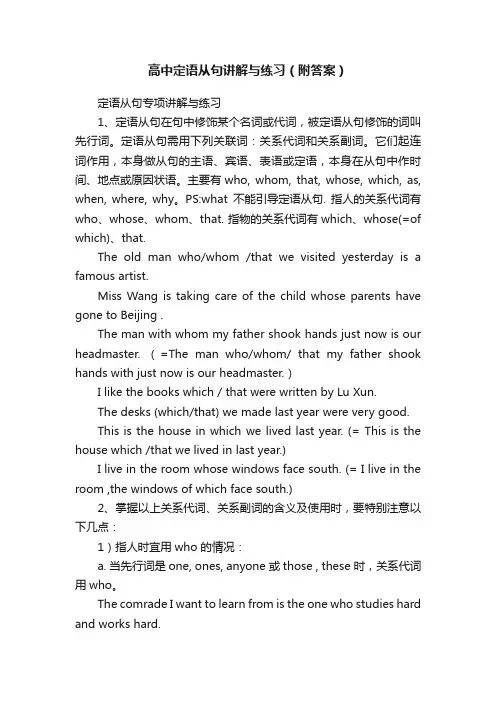
高中定语从句讲解与练习(附答案)定语从句专项讲解与练习1、定语从句在句中修饰某个名词或代词,被定语从句修饰的词叫先行词。
定语从句需用下列关联词:关系代词和关系副词。
它们起连词作用,本身做从句的主语、宾语、表语或定语,本身在从句中作时间、地点或原因状语。
主要有who, whom, that, whose, which, as, when, where, why。
PS:what不能引导定语从句. 指人的关系代词有who、whose、whom、that. 指物的关系代词有which、whose(=of which)、that.The old man who/whom /that we visited yesterday is a famous artist.Miss Wang is taking care of the child whose parents have gone to Beijing .The man with whom my father shook hands just now is our headmaster. (=The man who/whom/ that my father shook hands with just now is our headmaster.)I like the books which / that were written by Lu Xun.The desks (which/that) we made last year were very good.This is the house in which we lived last year. (= This is the house which /that we lived in last year.)I live in the room whose windows face south. (= I live in the room ,the windows of which face south.)2、掌握以上关系代词、关系副词的含义及使用时,要特别注意以下几点:1)指人时宜用who 的情况:a. 当先行词是one, ones, anyone 或those , these 时,关系代词用who。
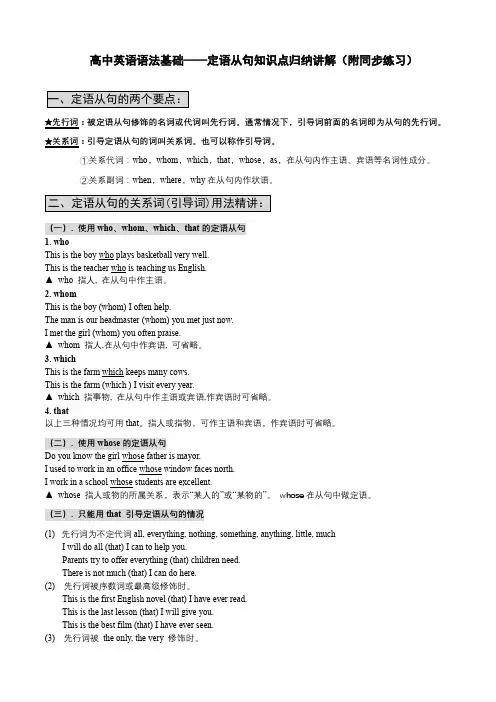
高中英语语法基础——定语从句知识点归纳讲解(附同步练习)★先行词:被定语从句修饰的名词或代词叫先行词。
通常情况下,引导词前面的名词即为从句的先行词。
★关系词:引导定语从句的词叫关系词。
也可以称作引导词。
①关系代词:who,whom,which,that,whose,as,在从句内作主语、宾语等名词性成分。
②关系副词:when,where,why在从句内作状语。
(一). 使用who、whom、which、that的定语从句1. whoThis is the boy who plays basketball very well.This is the teacher who is teaching us English.▲who 指人, 在从句中作主语。
2. whomThis is the boy (whom) I often help.The man is our headmaster (whom) you met just now.I met the girl (whom) you often praise.▲whom 指人,在从句中作宾语, 可省略。
3. whichThis is the farm which keeps many cows.This is the farm (which ) I visit every year.▲which 指事物, 在从句中作主语或宾语,作宾语时可省略。
4. that以上三种情况均可用that。
指人或指物,可作主语和宾语,作宾语时可省略。
(二). 使用whose的定语从句Do you know the girl whose father is mayor.I used to work in an office whose window faces north.I work in a school whose students are excellent.▲whose 指人或物的所属关系,表示“某人的”或“某物的”。
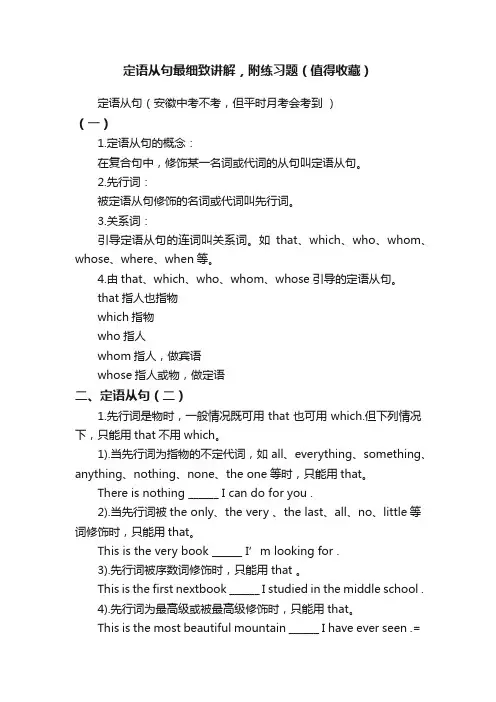
定语从句最细致讲解,附练习题(值得收藏)定语从句(安徽中考不考,但平时月考会考到)(一)1.定语从句的概念:在复合句中,修饰某一名词或代词的从句叫定语从句。
2.先行词:被定语从句修饰的名词或代词叫先行词。
3.关系词:引导定语从句的连词叫关系词。
如that、which、who、whom、whose、where、when等。
4.由that、which、who、whom、whose引导的定语从句。
that指人也指物which指物who指人whom指人,做宾语whose指人或物,做定语二、定语从句(二)1.先行词是物时,一般情况既可用that也可用which.但下列情况下,只能用that不用which。
1).当先行词为指物的不定代词,如all、everything、something、anything、nothing、none、the one等时,只能用that。
There is nothing ______ I can do for you .2).当先行词被the only、the very 、the last、all、no、little等词修饰时,只能用that。
This is the very book ______ I’m looking for .3).先行词被序数词修饰时,只能用that 。
This is the first nextbook ______ I studied in the middle school .4).先行词为最高级或被最高级修饰时,只能用that。
This is the most beautiful mountain ______ I have ever seen .=I have _____ seen _____ a beautiful mountian .5).先行词既有人也有物时,只能that 。
He told us many interesting things and persons _______ we had .2.先行词是物时,一般情况既可用that也可用which.但下列情况下,只能用which不用that。
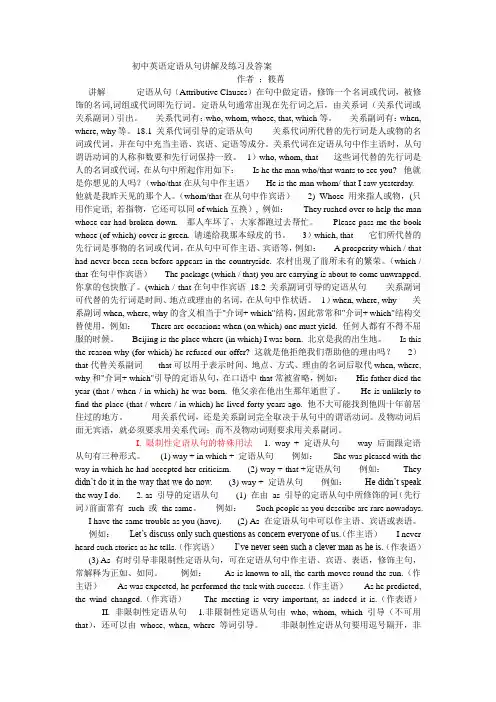
初中英语定语从句讲解及练习及答案作者;筱苒讲解定语从句(Attributive Clauses)在句中做定语,修饰一个名词或代词,被修饰的名词,词组或代词即先行词。
定语从句通常出现在先行词之后,由关系词(关系代词或关系副词)引出。
关系代词有:who, whom, whose, that, which等。
关系副词有:when, where, why等。
18.1 关系代词引导的定语从句 关系代词所代替的先行词是人或物的名词或代词,并在句中充当主语、宾语、定语等成分。
关系代词在定语从句中作主语时,从句谓语动词的人称和数要和先行词保持一致。
1)who, whom, that 这些词代替的先行词是人的名词或代词,在从句中所起作用如下: Is he the man who/that wants to see you? 他就是你想见的人吗?(who/that在从句中作主语) He is the man whom/ that I saw yesterday. 他就是我昨天见的那个人。
(whom/that在从句中作宾语) 2) Whose 用来指人或物,(只用作定语, 若指物,它还可以同of which互换), 例如: They rushed over to help the man whose car had broken down. 那人车坏了,大家都跑过去帮忙。
Please pass me the book whose (of which) cover is green. 请递给我那本绿皮的书。
3)which, that 它们所代替的先行词是事物的名词或代词,在从句中可作主语、宾语等,例如: A prosperity which / that had never been seen before appears in the countryside. 农村出现了前所未有的繁荣。
(which / that在句中作宾语) The package (which / that) you are carrying is about to come unwrapped. 你拿的包快散了。
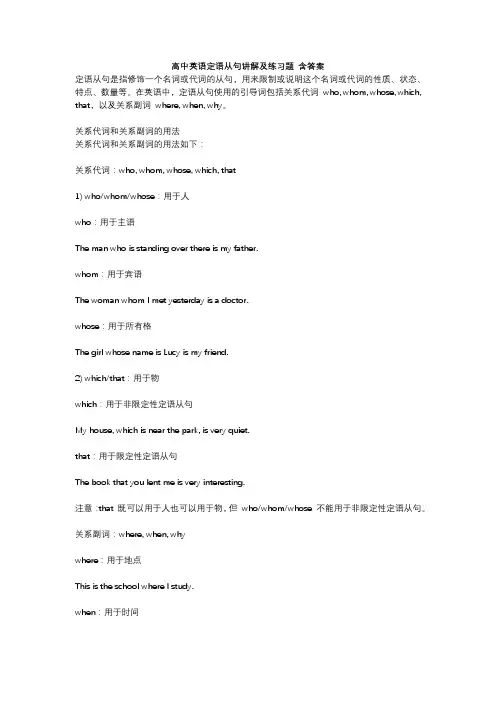
高中英语定语从句讲解及练习题含答案定语从句是指修饰一个名词或代词的从句,用来限制或说明这个名词或代词的性质、状态、特点、数量等。
在英语中,定语从句使用的引导词包括关系代词who, whom, whose, which, that,以及关系副词where, when, why。
关系代词和关系副词的用法关系代词和关系副词的用法如下:关系代词:who, whom, whose, which, that1) who/whom/whose:用于人who:用于主语The man who is standing over there is my father.whom:用于宾语The woman whom I met yesterday is a doctor.whose:用于所有格The girl whose name is Lucy is my friend.2) which/that:用于物which:用于非限定性定语从句My house, which is near the park, is very quiet.that:用于限定性定语从句The book that you lent me is very interesting.注意:that 既可以用于人也可以用于物,但who/whom/whose 不能用于非限定性定语从句。
关系副词:where, when, whywhere:用于地点This is the school where I study.when:用于时间I still remember the day when we first met.why:用于原因This is the reason why I am late.定语从句的位置定语从句通常紧跟在被修饰的名词或代词后面,如果是用关系代词who, whom, whose, which, that 引导的定语从句,则可以省略该代词的主语或宾语成分,并将关系代词作为引导词。
定语从句讲解及练习定语从句讲解和练习一、概念: He is the boy who often goes to school late.先行词关系词定语从句二、原则:a.定语从句必须紧紧地跟在先行词后面,限制修饰先行词。
b.定语从句必须用关系词来引导。
c.关系词在定语从句中作一个句子成分.三、扩大. She is the old woman whom I saw this morning.Mary is the girl whose parents work in Japan.Is this the key which you are looking for?October 1, 1949 is the day when New China was founded.This is the house where the great man was born.I don’t know t he reason why she looks unhap py today.四、下列定语从句只能用that来引导:1.先行词为形容词最高级所修饰This is the longest bridge that I have ever seen.2.先行词为序数词所修饰I happened to be the thousandth guest that visited the great hotel.This is the first composition that he has ever written in English.3.先行词既包括人又包括物They talked of things and persons that happened in the school.He talked about the teachers and schools that he had visited.4.主句是who或which开头的特殊疑问句中的定语从句Who is the man that came this morning?Which is the bag that you lost?5.先行词为the only, the very, the last, the same所修饰的定语从句He is the very person that the police are looking for.This is the only thing that I can remember.6.先行词是everything, nothing, something, all, little, much,everybody等不定代词Tell us everything that you know, please.Is there anything that you don’t understand?7.先行词被all, every, no, some, any, little, much修饰时All that glitters is not gold.I’ve read all the books that you gave me.五、“介词+ 关系词”及关系副词when, where, why1). The box is full of bottles. He is standing on the box.----> The box on which he is standing is full of bottles.The box where he is standing is full of bottles.2). This is the train. We work on the train.---->This is the train on which we work.This is the train where we work.3). I know the reason. She did it for the reason.---->I know the reason for which she did it.I know the reason why she did it.4). The man is our school master. You shook hands with the man justnow.----> The man with whom you shook hands is our schoolmaster. 5). The pen is made in Shanghai. She is writing with the pen.----> The pen with which she is writing is made in Shanghai.不能拆开的词组:look for / look after / catch hold of /take care of / put on / take off…….六、非限制性定语从句只对先行词起补充,说明的作用,常用逗号分开。
(完整版)定语从句全面详细讲解附练习题加答案定语从句详细讲解(一)定义及相关术语1.定语从句:修饰某一名词或代词的从句叫定语从句。
定语从句一般紧跟在它所修饰的先行词之后。
2.先行词:被定语从句修饰的词叫先行词。
3.关系词:引导定语从句的词叫关系词。
关系词有关系代词和关系副词。
关系代词有that, which, who, whom, whose, as等;关系副词有when, where, why等。
关系词通常有下列三个作用:A、引导定语从句;B、代替先行词;C、在定语从句中担当一个成分。
例如:The man who is shaking hands with my father is a policeman. 该句中,who is shaking hands with my father 是定语从句,修饰先行词the man,“who”是引导定语从句的关系词,代替先行词the man,在定语从句中作主语。
(二)关系代词引导的定语从句1.who 指人,在定语从句中作主语。
The boys who are playing football are from Class One. 正在踢足球的男孩是一班的。
Those who want to go to the museum must be at the school gate at 7 tomorrow morning. 想去博物馆的人必须在明晨7点到大门口集合。
Yesterday I helped an old man who had lost his way. 昨天我帮助了一位迷路的老人。
That is the teacher who teaches us physics. 那就是教我们物理的老师。
2.whom 指人,在定语从句中做宾语,常可省略。
Mr Liu is the person ( whom ) you talked about on the bus. 刘先生就是你们在公共汽车上谈论的那个人。
英语定语从句讲解及练习1. 什么是定语从句定语从句是英语中一种常用的修饰成分,用于修饰名词或代词,在句中起定语的作用。
2. 定语从句的构成定语从句由关系词引导,关系词可以是关系代词或关系副词。
2.1 关系代词关系代词有:who, whom, whose, which, that。
- who 和 whom 用于修饰人。
- whose 用于修饰所有格。
- which 用于修饰物。
- that 同时可以修饰人和物。
2.2 关系副词关系副词有:when, where, why。
- when 用于修饰时间。
- where 用于修饰地点。
- why 用于修饰原因。
3. 怎么使用定语从句定语从句一般紧跟在被修饰的名词或代词后面,并且在从句中起修饰作用。
关系词所在的位置可以是主语、宾语或介词宾语的位置。
以下是一些例句来说明如何使用定语从句:1. The person who is sitting next to me is my best friend.(坐在我旁边的那个人是我最好的朋友。
)(你知道她为什么没来的原因吗?)3. This is the book which I bought yesterday.(这是我昨天买的书。
)练题:1. Can you lend me the pen ___________ doesn't have ink anymore? (which / who)2. The girl ___________ is standing over there is my sister. (who / what)3. I have a dog ___________ barks all night. (which / whose)请在下面填写正确答案:1. which2. who3. that---> 注意:以上答案仅供参考,实际情况应根据具体语境来确定。
定语从句讲解与练习一.定义:在复合句中修饰某一名词或代词的从句叫定语从句。
二.特点:1.先行词:定语从句所修饰的名词或代词2. 关联词:1)引出定语从句,并作从句的一个成分。
可作主语、宾语、定语、状语,作宾语可省略。
2)关联词包括关系代词和关系副词。
关联词位于先行词和定语从句之间。
关系代词:that, which, who, whom, whose代指先行词。
关系副词:when, where, why作时间状语。
三.基本结构:先行词+关联词+定语从句剩余部分四.关系代词的用法:1. that 和whichthat指人或物,作主语或宾语,作宾语可省略,主语不能。
Which指物,不指人,作主语或宾语,作宾语可省略,主语不能。
His father works in a factory that/which makes TV sets.Who was hurt in the accident that/which happened yesterday?The coat (which/that) I put on the desk is black.注意:The room in which I live is very big. (在介词后面不能用that)2.只能用that不能用which引导的定语从句:1) 先行词被形容词最高级修饰时,定语从句只能用thatThis is the most interesting story (that) I have ever heard.2)先行词被序数词修饰时,定语从句只能用thatThe children like the second lesson that is about “The Football Match”.3)先行词被the only,the very 或the same等修饰,定语从句只能用that引导。
It is the only word (that) I know in the passage.Where is the very book (that) I bought just now?This is the (same) bicycle (that) I lost.4)先行词为everything,something,anything,all,none,much,little,few 等不定代词时,定语从句只能用thatI want everything (that) I want.I am writing to tell you about something very strange that happened to me last week.5)先行词被不定代词all, any, no, every, little, much, many修饰时,只能用that Here is all the money (that) I have.6)先行词是同时含有“人和物”的名词时,定语从句只能用thatI can remember well the persons and some pictures (that) I see in the room.7)定语从句所修饰的词为the one 时,定语从句用that引导Is it the one(that)you want?8)为了避免重复,在疑问词who之后,用that 引导定语从句Who is the girl that won the first place?3. who和whomwho指人,在句中作主语和宾语,作宾语可省略。
英语定语从句解题技巧讲解及练习题(含答案)及解析一、定语从句1.Everyone ____ has been to Shanghai says it is a modern city.A.why B.whose C.who D.which【答案】C【解析】【分析】【考点定位】:考查定语从句。
【详解】试题分析:句意:去过上海的每个人都说它是一个现代化的城市。
why为什么;whose谁的;who谁,可以引导定语从句,主语是人;which哪一个,可以引导定语从句,先行词指物。
根据句意可知,这里考查的是定语从句,先行词是Everyone,指代人,根据句意可知选C。
2.The last place _______ we visited was Chaoshan Custom Museum.A.where B.that C.when D.why【答案】B【解析】句意:我们参观的最后一个地方是潮汕风俗博物馆。
根据句子结构可知,这里考查的是定语从句,where关系副词,指地点;that关系代词,先行词为物;when关系副词,指时间;why关系副词,指原因。
定语从句中visited后缺少宾语,故应填关系代词,选B。
3.–– What are you looking for?––I’m looking for the book _______ you bought last Sunday.A.who B.when C.that【答案】C【解析】句意:——你正在寻找什么?——我正在寻找上周日你买的那本书。
who引导定语从句,修饰人,作定语从句的主语或宾语;when引导定语从句,作状语;that引导定语从句,修饰事物或人,作主语或宾语。
此处修饰的先行词the book是事物,作定语从句谓语bought的宾语,故用that引导定语从句,故选C。
4.The girl catches the flowers on a wedding will be the next to get married.A.whom B.which C.who D.whose【答案】C【解析】考查定语从句的用法。
中考初中定语从句专项讲解与练习在复合句中,修饰某一名词或代词的从句叫定语从句。
被修饰的名词或代词叫先行词,定语从句一般放在先行词的后面。
二、定语从句的关系词引导定语从句的关系词有关系代词和关系副词,常见的关系代词包括that,which,who(宾格whom,所有格whose)等,关系副词包括where,when,why等。
关系代词和关系副词放在先行词及定语从句之间起连接作用,同时又作定语从句的重要成分。
三、定语从句的分类根据定语从句与先行词的关系,定语从句可分为限制性定语从句及非限制性定语从句。
限制性定语从句紧跟先行词,主句与从句不用逗号分开,从句不可省去,非限制性定语从句主句与从句之间有逗号分开,起补充说明作用,如省去,意思仍完整。
四、关系代词的用法1. that 既可以用于指人,也可以用于指物。
在从句中作主语或宾语。
例如:Mary likes music that is quiet and gentle.(that作主语)The coat (that)I put on the desk is blue.(that作宾语)2.which用于指物,在句中作主语或宾语。
例如:The building which stands near the train station is a supermarket.(作主语)The film (which)we saw last night was wonderful. (作宾语)3.who,whom用于指人,who 用作主语,whom用作宾语。
在口语中,有时可用who代替whom。
例如:The girl who often helps me with my English is from England.(作主语)Who is the teacher (whom)Li Ming is talking to?(作宾语)注意:1)当关系代词在定语从句中充当宾语时,who、that、which可省略,但介词在关系代词前时,只能用“介词+which/whom”结构(此时关系代词不能用that代替)。